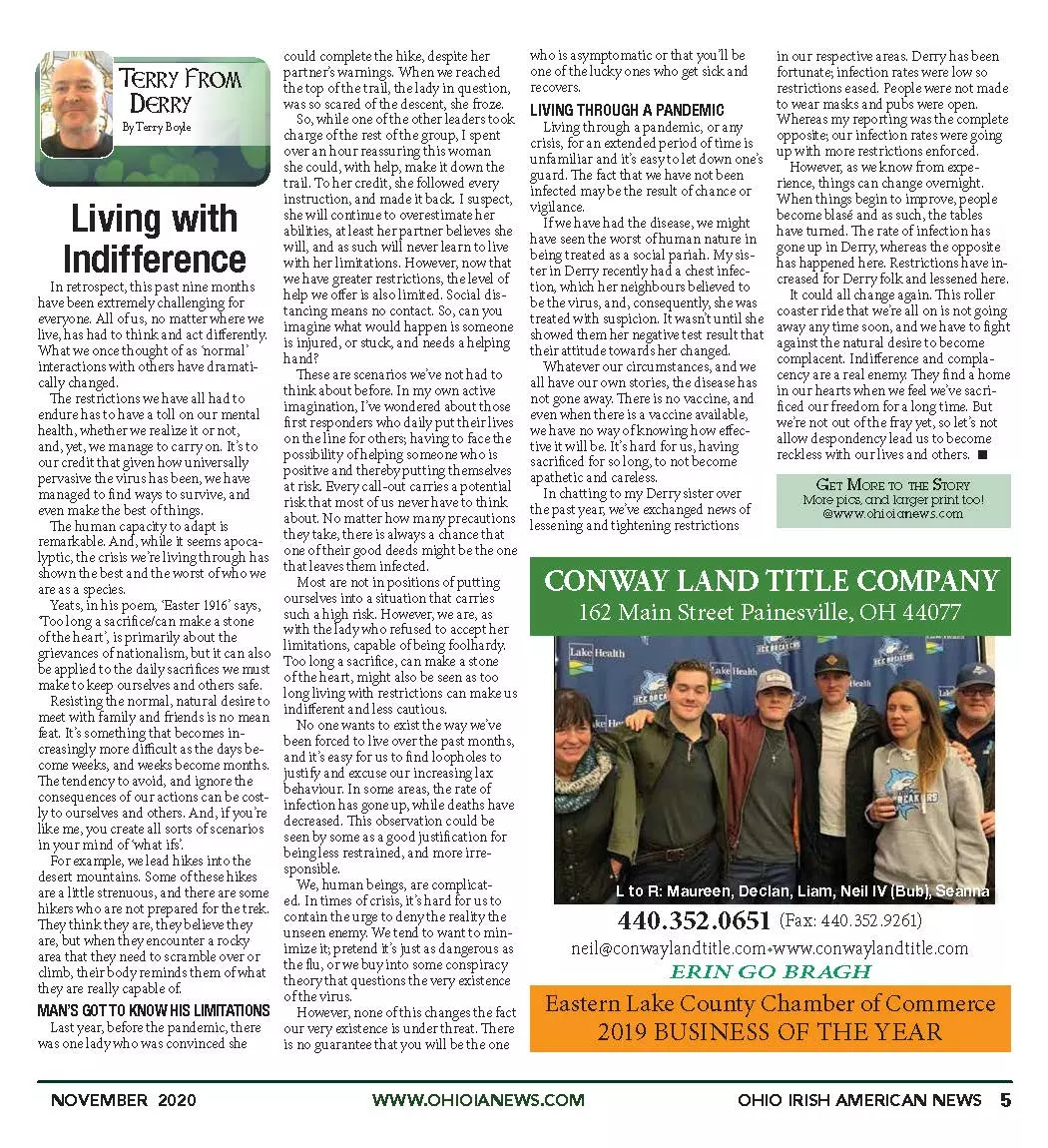Living with Indifference: Terry from Derry
- John O'Brien
- October 28, 2020
- Edited 5 months ago
Table of Contents

Terry from Derry: Living with Indifference
By Terry Boyle
In retrospect, this past nine months have been extremely challenging for everyone.
All of us, no matter where we live, has had to think and act differently. What we once thought of as ‘normal’ interactions with others have dramatically changed.
The restrictions we have all had to endure has to have a toll on our mental health, whether we realize it or not, and, yet, we manage to carry on. It’s to our credit that given how universally pervasive the virus has been, we have managed to find ways to survive, and even make the best of things.
The human capacity to adapt is remarkable. And, while it seems apocalyptic, the crisis we’re living through has shown the best and the worst of who we are as a species.
Yeats, in his poem, ‘Easter 1916’ says, ‘Too long a sacrifice/can make a stone of the heart’, is primarily about the grievances of nationalism, but it can also be applied to the daily sacrifices we must make to keep ourselves and others safe.
Resisting the normal, natural desire to meet with family and friends is no mean feat. It’s something that becomes increasingly more difficult as the days become weeks, and weeks become months. The tendency to avoid, and ignore the consequences of our actions can be costly to ourselves and others. And, if you’re like me, you create all sorts of scenarios in your mind of ‘what ifs’.
For example, we lead hikes into the desert mountains. Some of these hikes are a little strenuous, and there are some hikers who are not prepared for the trek. They think they are, they believe they are, but when they encounter a rocky area that they need to scramble over or climb, their body reminds them of what they are really capable of.
Man’s Got to Know His Limitations
Last year, before the pandemic, there was one lady who was convinced she could complete the hike, despite her partner’s warnings. When we reached the top of the trail, the lady in question, was so scared of the descent, she froze.
So, while one of the other leaders took charge of the rest of the group, I spent over an hour reassuring this woman she could, with help, make it down the trail. To her credit, she followed every instruction, and made it back. I suspect, she will continue to overestimate her abilities, at least her partner believes she will, and as such will never learn to live with her limitations. However, now that we have greater restrictions, the level of help we offer is also limited. Social distancing means no contact. So, can you imagine what would happen is someone is injured, or stuck, and needs a helping hand?
These are scenarios we’ve not had to think about before. In my own active imagination, I’ve wondered about those first responders who daily put their lives on the line for others; having to face the possibility of helping someone who is positive and thereby putting themselves at risk. Every call-out carries a potential risk that most of us never have to think about. No matter how many precautions they take, there is always a chance that one of their good deeds might be the one that leaves them infected.
Most are not in positions of putting ourselves into a situation that carries such a high risk. However, we are, as with the lady who refused to accept her limitations, capable of being foolhardy. Too long a sacrifice, can make a stone of the heart, might also be seen as too long living with restrictions can make us indifferent and less cautious.
Lax Behavior Loopholes
No one wants to exist the way we’ve been forced to live over the past months, and it’s easy for us to find loopholes to justify and excuse our increasing lax behaviour. In some areas, the rate of infection has gone up, while deaths have decreased. This observation could be seen by some as a good justification for being less restrained, and more irresponsible.
We, human beings, are complicated. In times of crisis, it’s hard for us to contain the urge to deny the reality the unseen enemy. We tend to want to minimize it; pretend it’s just as dangerous as the flu, or we buy into some conspiracy theory that questions the very existence of the virus.
However, none of this changes the fact our very existence is under threat. There is no guarantee that you will be the one who is asymptomatic or that you’ll be one of the lucky ones who get sick and recovers.
Living Through a Pandemic
Living through a pandemic, or any crisis, for an extended period of time is unfamiliar and it’s easy to let down one’s guard. The fact that we have not been infected may be the result of chance or vigilance.
If we have had the disease, we might have seen the worst of human nature in being treated as a social pariah. My sister in Derry recently had a chest infection, which her neighbours believed to be the virus, and, consequently, she was treated with suspicion. It wasn’t until she showed them her negative test result that their attitude towards her changed.
Whatever our circumstances, and we all have our own stories, the disease has not gone away. There is no vaccine, and even when there is a vaccine available, we have no way of knowing how effective it will be. It’s hard for us, having sacrificed for so long, to not become apathetic and careless.
In chatting to my Derry sister over the past year, we’ve exchanged news of lessening and tightening restrictions in our respective areas. Derry has been fortunate; infection rates were low so restrictions eased. People were not made to wear masks and pubs were open.
Whereas my reporting was the complete opposite; our infection rates were going up with more restrictions enforced.
However, as we know from experience, things can change overnight. When things begin to improve, people become blasé and as such, the tables have turned. The rate of infection has gone up in Derry, whereas the opposite has happened here. Restrictions have increased for Derry folk and lessened here.
It could all change again. This roller coaster ride that we’re all on is not going away any time soon, and we have to fight against the natural desire to become complacent.
Indifference and complacency are a real enemy. They find a home in our hearts when we feel we’ve sacrificed our freedom for a long time. But we’re not out of the fray yet, so let’s not allow despondency lead us to become reckless with our lives and others.





